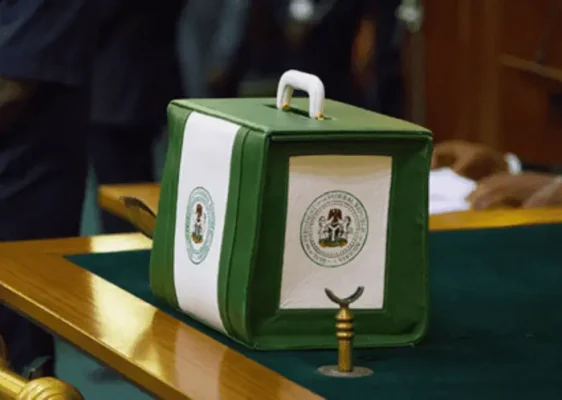The Nigerian Economic Society, (NES), has urged a comprehensive re-evaluation of the proposed N47.18 trillion budget for 2025, expressing concerns over its feasibility and potential economic repercussions.
The budget, recently approved by the Federal Executive Council (FEC) as part of the Medium-Term Expenditure Framework (MTEF) for 2025–2027, has drawn criticism from experts, who argue that its assumptions and projections require significant adjustments.
On Thursday, November 14, the Federal Executive Council (FEC) approved Nigeria’s proposed 2025 expenditure budget of N47.18 trillion ($28.18 billion).
The budget anticipates a Gross Domestic Product (GDP) growth rate of 4.6 percent and an exchange rate of N1,400 to the dollar.
A statement signed by NES President, Professor Adeola F. Adenikinju, emphasised the need to redefine the budget’s priorities and adopt a more balanced fiscal approach.
“It is equally apparent that the budget stance and its priorities need to be reworked to specifically and clearly define its core priorities to achieve implementation traction along explicit lines of fiscal consolidation,” the body stated.
NES recommends lowering the 2025 oil price benchmark to $70 per barrel to better accommodate potential market shocks. While the oil production target of 2.06 million barrels per day (mbpd) is deemed feasible, achieving this depends on sustained efforts to combat oil theft and pipeline vandalism. Despite the conservative appearance of the $75 per barrel benchmark, global dynamics such as energy transitions and geopolitical shifts warrant a more cautious approach.
The proposed budget includes a deficit of N13.8 trillion, or 3.87 percent of the estimated GDP, exceeding the 3 percent threshold stipulated by the Fiscal Responsibility Act (FRA) of 2007.
NES cautions that the actual deficit could surpass projections, as evidenced by the 2024 deficit reaching 7.5 percent of GDP by the third quarter, far above the approved 3.8 percent target. This trend, NES warns, could exacerbate inflation, increase debt servicing costs, and strain the naira.
“We recommend that the legislature properly reviews budget performance from 2021 to 2024 to determine an appropriate deficit limit for 2025. Revenue assumptions should be conservative and sustainable to prevent major macroeconomic instability,” the society stated.
NES expressed skepticism about the proposed exchange rate of N1,400/$1, which deviates from major expert projections.
Leading global financial institutions predict a base-case exchange rate of N1,750/$1, while NES projects N1,850/$1 for 2025. This reflects the challenges of limited foreign exchange (forex) reserves and the risks of relying on oil exports.
On GDP growth, NES suggests revising the 4.6 percent projection to align with the IMF’s estimate of 3.2 percent, the World Bank’s 3.5 percent, and Fitch’s 3.5 percent. Domestic risks such as high inflation, weakened purchasing power, insecurity, and high interest rates should also be factored into growth expectations, it said.
The N47.18 trillion budget ($27.96 billion at N1,679/$1) represents a 64.39 percent nominal increase over 2024’s N28.7 trillion but is only 20.52 percent of Nigeria’s nominal GDP of N229.9 trillion.
In contrast, other African nations like South Africa (33 percent) and Ghana (27.5 percent) allocate significantly higher government spending as a percentage of GDP.
Per capita, the budget equates to $115.4 expenditure for each Nigerian in 2025, far below the $7,500 per capita expenditure in California’s $300 billion budget for 40 million people. NES noted, “While we cannot be California overnight, Nigerians buy fuel, medicine, and other essentials at the same global prices as Californians.”
Revenue projections for 2025 stand at N18.32 trillion, slightly lower than the N19.5 trillion target in 2024. Oil revenue is expected to contribute N7.68 trillion, with government-owned enterprises accounting for N4.07 trillion.
Key allocations include non-debt recurrent expenditure (N9.92 trillion), capital expenditure (N7.72 trillion), and debt service (N8.25 trillion).
NES criticised the low capital expenditure, which represents only 16.36 percent of total spending, compared to international benchmarks of 50 percent for developing countries. “Capital expenditure is critical for infrastructure growth, job creation, and poverty reduction. Yet, debt servicing at 17.49 percent of total expenditure outpaces capital investments, limiting domestic growth,” NES highlighted.
Nigeria’s national debt grew by 53.72 percent from N87.3 trillion in June 2023 to N134.2 trillion in June 2024. Debt-to-GDP and debt-to-revenue ratios are alarmingly high, signaling unsustainable borrowing trends.
NES projects a 25 percent revenue shortfall in 2025, potentially increasing the budget deficit to N18.3 trillion.
“The government must prioritize revenue generation, fiscal discipline, and attract private sector funding through transparent processes,” NES urged. Unchecked spending could worsen inflation, debt levels, and macroeconomic instability.
NES recommends reforms in budget preparation, execution, and monitoring to address inefficiencies and corruption.
It observed that over 56,000 abandoned projects and persistent fiscal leakages highlight systemic weaknesses. “The final budget must eliminate waste, reduce political pressures, and ensure continuity in policies and project implementation,” NES advised.
By addressing these concerns, the body believes that the government can create a more effective budget framework to tackle Nigeria’s pressing challenges, including macroeconomic stability, poverty reduction, and job creation.
READ ALSO: The killing of Citizen Joe Phillip
Get real-time news updates from Tribune Online! Follow us on WhatsApp for breaking news, exclusive stories and interviews, and much more.
Join our WhatsApp Channel now
